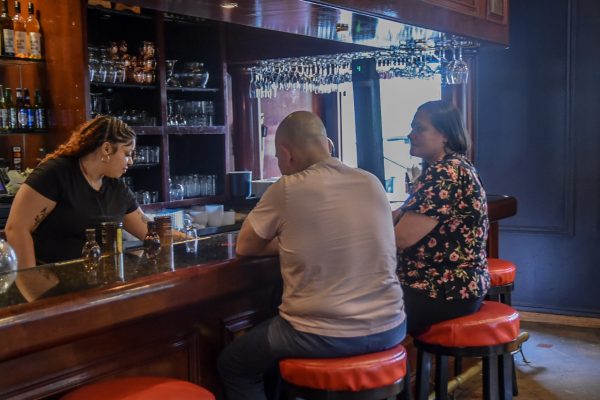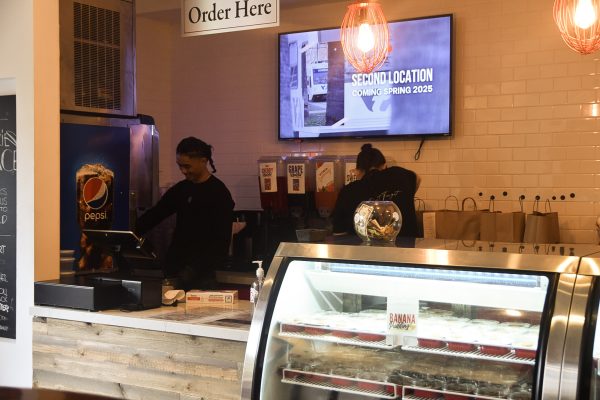Island Taste Caribbean Grill in downtown San Jose is every foodie’s tropical treasure — the restaurant greets customers with aromatic, fresh portions of Caribbean dishes, a collaged, colorful interior and reggae reverberating throughout its warm atmosphere. The grill is owned and operated by Marc St. Fleur and his wife, second-generation Caribbean immigrants from Brooklyn who blend their Haitian and Jamaican roots to share the vibrancy of Caribbean cuisine with the Bay Area. Each item on Island Taste’s menu has a name that holds special significance to the couple’s foundations — for example, the “1804” is Haitian tasso named after the year of Haiti’s independence, and “Stir it Up” is jerk tofu that takes its name from the 1975 Bob Marley single.

Similarly, public policy advisor-turned-culinary historian Adrian Miller has dedicated his career to celebrating Black foods and the stories behind them. Miller has distilled years of research into writing, most notably his 2013 book “Soul Food” and 2017 book “The President’s Kitchen Cabinet.” He believes that food has played a crucial role in reflecting Black social and cultural changes over the course of American history.
“Black restaurants are a way to get a taste of the past, that nostalgic taste of family and community that they may not be able to get,” Miller said. “Throughout the civil rights movement, restaurants played an important role as meeting spaces or just providing food for civil rights workers. So, they literally nourished the civil rights movement and continue to play an important role in creating community today.”
That community environment is a big part of what drew 24-year-old and Evergreen, San Jose resident Hailey Smith to become a front-of-house manager at Jackie’s Place, a celebrated soul food spot in San Jose. The restaurant boasts a wide array of fresh southern food, a signature “Juju” Kool-Aid drink and warm family environment, inviting customers of all backgrounds to take a bite.
“I loved that when I came in, I got to see a diverse group of people,” Smith said. “Something that attracted me to working here is that I could see people who look like me. That’s not something that is very common in San Jose.”

Because soul food’s storied flavors have become a distinct cuisine to preserve and share, the history of Black cuisine originally stems from resistance against chattel slavery. Soul food’s foundation is in enslaved peoples’ efforts to foster a cuisine under slavery despite the restrictions and control placed on ingredient access by white slaveowners. Miller acknowledges a newfound appreciation for the stories of Black food and its influence in America’s history after researching for his book “Soul Food: The Surprising Story of an American Cuisine, One Plate at a Time.”
“People got five pounds of starch, depending on what the cheapest thing available was, a couple of pounds of preserved meat, and then a jug of molasses,” Miller said. “Enslaved people had to figure out how to survive given those meager rations. After emancipation, African Americans were certainly freer to eat a lot of different foods, but their class position in this society also controlled them, in a way, because they were often very poor and very food insecure.”
The formation of dishes around allotted ingredients also contributed to a unique, location-dependent soul food cuisine and Smith has recognized differences in the food she’s eaten in different places. She says that in Arkansas, soul food incorporates ingredients like chitlins compared to the Virginian food, which overlaps more with Jackie’s Place menu, using fried fish and collard greens. St. Fleur is familiar with that intersection, as his restaurant mixes the foods of his Haitian culture with his wife’s Jamaican culture. He recognizes the distinctness of each Caribbean cuisine, but also appreciates the similarity in spices and seasonings between the two, contributing to a dynamic, colorful blend of cultures.
Miller believes that these cross-cultural experimentations and interactions make the Bay Area a richly diverse hub for Black cultural food. However, despite the cuisines that have flourished in specific communities, Miller emphasizes foods have not always been clearly categorized along racial lines.
“We’ve got all these representations of Black food traditions,” Miller said. “It’s pretty cool, right? But historically, food in the United States is really about class and place. As much as we like to think it’s about race, it’s really about those two things, so that people of the same socioeconomic status in a place usually are eating the same foods.”
Smith agrees with this sentiment, noting Jackie’s Place’s diverse employees reflect the San Jose community and its customers — she recalls families from Modesto, Sacramento and even Florida who have dined at the spot in search of comforting soul food in the Bay Area. One of Smith’s favorite memories is serving Vallejo native and Bay Area rapper E-40 and players from the San Francisco 49ers. While she appreciates how the restaurant’s authentic menu attracts celebrities, she wishes more Bay Area natives were aware of the welcoming atmosphere Jackie’s Place provides their customers.
“People walk in here with expectations, and those expectations are not good expectations,” Smith said. “They don’t expect it to look this clean or have really good food, because that’s an unfortunate stereotype about Black-owned businesses. But, I do like that we can surprise people in a pleasant way. I wish that more people knew that when you walk in, we’re going to treat you like family, we’re going to feed you well and we’re going to get you out that door.”

Despite the wide geographic range Black owned restaurants in the Bay Area cover, such as Caribbean, Ethiopian and soul food, St. Fleur recognizes an insufficient representation of these and other cuisines in the Bay Area, contributing to a lack of variety in food culture. Compared to his time living in New York, St. Fleur feels the wide array of cultures and cuisines prominent on the East Coast account for a more accessible and complete picture of the diverse communities living in the U.S.
“I try to expose people to a different culture and different dishes,” St. Fleur said. “Some people are so stuck in their own box, so tunnel-visioned, all they know is one type of food, like Asian food or Indian food. But try something new, and if you like it, you like it.”
As a restaurant owner, St. Fleur says the feeling of sharing Haitian and Jamaican cuisine is “priceless” and believes his restaurant’s strong ratings speak for the quality and heartfelt effort he and his wife put into the business. With 2025 being Island Taste’s third year in business, St. Fleur hopes for a larger uptick in patrons, noting the hardships of maintaining a steady restaurant after the COVID-19 pandemic.
Similarly, after persevering through a damaging fire in 2020 that almost meant permanent closure, Smith says Jackie’s Place is grateful for the community fundraising and support that allowed the restaurant to stay in business. Miller believes celebrating Black culture through purchasing and reading Black authored books and going to Black owned restaurants, is what will preserve Black culture in the future.
“Continue to tell the stories, and tell them in a way that will get people to support Black creatives, cooks and restaurants,” Miller said. “Being in the hospitality industry is hard. It may be even harder in the years to come, so we need to do everything we can to celebrate these folks.”
This story was originally published on El Estoque on March 7, 2025.






































